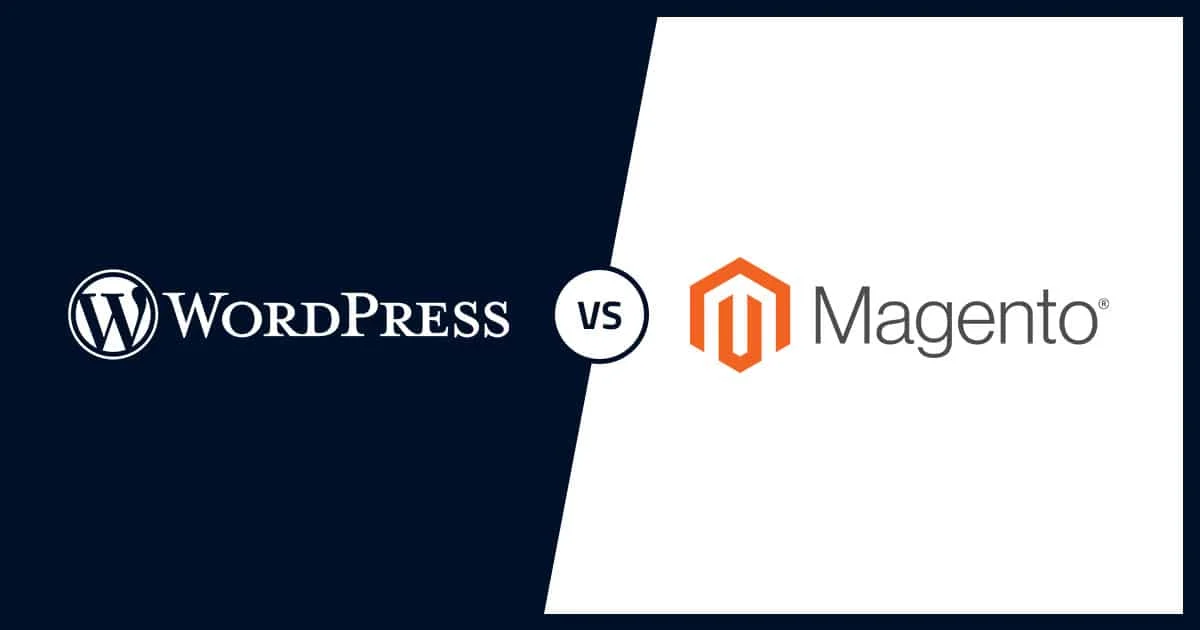WordPress and Magento are two different tools that serve different purposes, so it depends on your specific needs and goals.
WordPress is a popular content management system (CMS) primarily used for creating blogs and websites. It is known for its ease of use, flexibility, and vast selection of plugins and themes. WordPress is an excellent choice for creating simple to moderately complex websites such as personal blogs, business websites, and online portfolios.
On the other hand, Magento is an e-commerce platform specifically designed for creating online stores. It is highly customizable and scalable, making it an excellent choice for larger online stores with a significant number of products and customers. Magento offers advanced features such as order management, product customization, and marketing tools to help you grow your online business.
In summary, if you are looking to create a simple website or blog, WordPress may be the best option for you. But if you plan to build a complex online store, Magento may be the better choice. Ultimately, your choice will depend on your specific needs, budget, and technical expertise.
WordPress is a free and open-source content management system (CMS) that allows users to create and manage websites and blogs. It is written in PHP programming language and uses a MySQL database to store and manage website content. WordPress was first released in 2003, and has since become one of the most popular CMSs in the world, powering over 40% of all websites on the internet.
One of the main advantages of WordPress is its user-friendly interface, which makes it easy for non-technical users to create and manage content on their websites. WordPress also offers a vast library of themes and plugins that can be used to customize the look and functionality of a website without requiring any coding knowledge.
WordPress is used by individuals, small businesses, and large corporations alike. It is an excellent tool for creating websites, blogs, portfolios, e-commerce stores, and much more. Additionally, because it is open-source, developers can modify and extend its functionality to suit their specific needs.



Magento is an open-source e-commerce platform that allows businesses to create and manage online stores. It was first released in 2008 and has since become one of the most popular e-commerce platforms in the world, used by small businesses and large corporations alike.
Magento offers a wide range of features and functionalities that enable businesses to create custom online stores that can be tailored to their specific needs. It provides a flexible and scalable platform, making it suitable for businesses of all sizes, from small startups to large enterprises.
Some of the key features of Magento include:
- Product management: Ability to manage products and categories, inventory, and pricing.
- Checkout and payment: A streamlined checkout process and integration with multiple payment gateways.
- Marketing and SEO: Tools for search engine optimization (SEO), social media integration, and email marketing.
- Reporting and analytics: Comprehensive reporting and analytics tools to track sales, customer behavior, and more.
One of the main advantages of Magento is its flexibility and customization options, which allow businesses to create unique online stores that stand out from their competitors. Additionally, because it is open-source, developers can modify and extend its functionality to suit their specific needs.
CONCLUSION
It is not accurate to conclude which one is better between WordPress and Magento as they are designed for different purposes.
WordPress is primarily a content management system (CMS) that is best suited for creating and managing websites, including blogs, portfolios, business sites, and small to medium-sized e-commerce stores. It is easy to use, versatile, and has a large community of users and developers, making it a popular choice for many website owners.
On the other hand, Magento is an e-commerce platform designed specifically for creating and managing large online stores with a high volume of transactions. It is robust, scalable, and has advanced features that cater to the needs of online merchants. It is a better choice for businesses that require complex e-commerce functionalities such as inventory management, multiple storefronts, and advanced marketing tools.
In summary, both WordPress and Magento have their unique features and are suitable for different types of websites. The best choice depends on your specific needs, goals, and budget. You can also check the Flutter vs React Native guide to explore more opportunities.
KEY POINTS
WordPress
- User-friendly interface: WordPress has a user-friendly interface that makes it easy for non-technical users to create and manage website content.
- Customizable themes: WordPress offers a vast library of customizable themes that can be used to create unique website designs without requiring any coding knowledge.
- Extensive plugin library: WordPress has a vast library of plugins that can be used to add functionality to a website, such as contact forms, social media integration, and e-commerce capabilities.
- Search engine optimization (SEO) friendly: WordPress is SEO-friendly and provides built-in features to optimize a website for search engines.
- Mobile-responsive design: Most WordPress themes are mobile-responsive, meaning that they can be easily viewed on mobile devices.
- Multilingual support: WordPress supports multiple languages, making it suitable for creating websites in different languages.
- Community support: WordPress has a large community of users and developers who contribute to its development and provide support through forums, documentation, and other resources.
Magento
- Customizable e-commerce platform: Magento is a highly customizable e-commerce platform that allows businesses to create unique online stores tailored to their specific needs.
- Flexibility and scalability: Magento is flexible and scalable, making it suitable for businesses of all sizes, from small startups to large enterprises.
- Advanced product management: Magento provides advanced product management features such as product catalogs, inventory management, and pricing.
- Checkout and payment options: Magento offers a streamlined checkout process and integration with multiple payment gateways, making it easy for customers to complete purchases.
- Marketing and SEO capabilities: Magento provides marketing and SEO capabilities such as search engine optimization, social media integration, and email marketing.
- Reporting and analytics: Magento provides comprehensive reporting and analytics tools to track sales, customer behavior, and more.
- Open-source platform: Magento is an open-source platform, meaning that developers can modify and extend its functionality to suit their specific needs. It also works perfectly for your React Native app development services.







